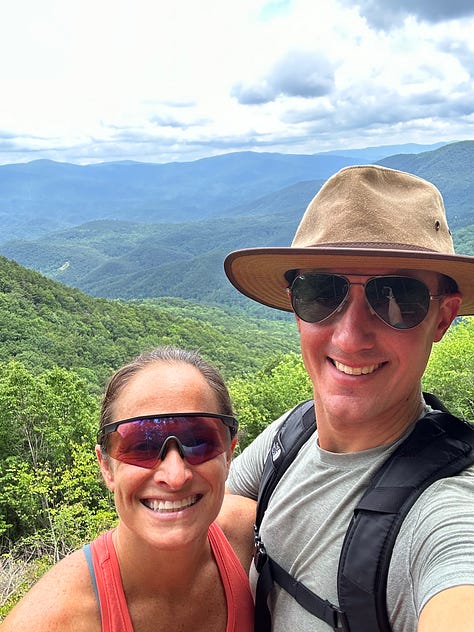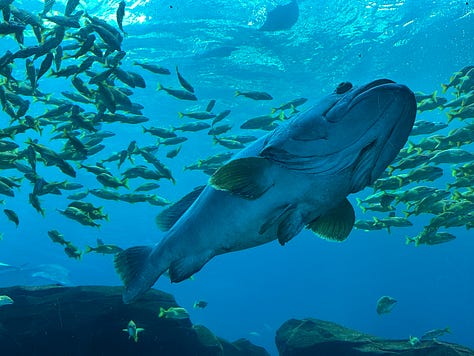Triathlon is What You Do, Not Who You Are
You might be a triathlete, but you're really just a person who does triathlon.
Triple Threat Life is an email newsletter with practical triathlon tips and mindset techniques to help everyday athletes succeed. Some installments are free. Some benefits are for paid subscribers only. Sign up here.
Recently, I came across a story about Seton Hall University and their student-based chapter of The Hidden Opponent.
Essentially, The Hidden Opponent is a non-profit organization that promotes mental health advocacy, education, and support for student-athletes. Their efforts are focused on breaking the stigma surrounding mental health in sports and providing resources to those who need them.
It’s pretty cool.
For example, if an athlete is having a hard time, whether it’s due to a performance-based issue or otherwise, they can go to a trainer and set up to speak with a doctor, who will work with them in a way that’s specifically geared to their sport.
And while you might not be a student-athlete anymore (I’m definitely not) that doesn’t mean we can’t all benefit from a perspective-shift when it comes to thinking about sports in general.
While sport can bring so much to our lives, like improved health and fitness, motivation to push our personal limits, and an outlet for competition and setting goals, it’s important to remember that sport is what we do, not who we are.
Why is this important?
Read on to find out.
Mental health problems aren’t weird (or uncommon)
Here’s a few interesting statistics.
Did you know:
51.7% of elite athletes struggle with mental health problems at some point in their life (2020 study)
Training over 14 hours a week can worsen mental health in some athletes (2018 study)
1 in 5 elite athletes met the clinical definition for anxiety or depression (2018 study)
Athletes in a poor mental state are at higher risk for burnout and losing interest in their sport.
What can we take from this? Well, for one, mental health problems are very common among athletes, even those at the peak of their sport (think Michael Phelps or Simone Biles) struggle at times. Two, while physical exercise can do wonders for reducing stress and improving mental health, too much can have the opposite effect, causing mental health problems.
“Mental health problems” might sound like a weird term, but it’s not really.
Essentially, mental health refers to our emotional, psychological, and social well-being. It affects how you feel, think, act, and respond to situations in life. It determines how you handle stress and impacts the choices you make.
While mental health problems might include a clinical condition like anxiety, depression, or obsessive-compulsive disorder, it doesn’t have to. A mental health problem simply means you’re having a problem with your mental health!
It could be a big problem or a small problem. And it’s something we all deal with from time to time.
“Exercise is my therapy”
How often have you heard an athlete say this?
“Exercise is my therapy.”
And that may be true. Physical activity is an excellent way to improve mental health. It can reduce risk of anxiety and depression. It enhances mood, boosts overall well-being, impacts sleep quality, improves self-esteem, and promotes resilience to stress. It also regulates chemicals in the brain, like serotonin and endorphins (happy feelings!)
But we must recognize that exercise isn’t a cure-all. Just because you have the mental strength and physical fortitude to complete an event like an Ironman, that doesn’t mean you aren’t struggling with a hidden injury that lies underneath.
Also, you can be addicted to exercise, just like someone might be addicted to alcohol or drugs. Yes, it’s a slightly “healthier” addiction, but if you can’t function without exercising for a day or two without completely falling apart, that’s a red flag (some people actually experience withdrawal symptoms.)
Like my strength coach says, “Just because some is good. That doesn’t mean more is better.”
Therefore, it’s crucial that you have a healthy relationship with your sport of choice, (whether it’s triathlon, running, soccer, basket-weaving, ect.)
The problem with endurance athletes
An interesting piece in Triathlete examines mental health in endurance sports, specifically. Jill Coangelo is a triathlete and runner and, for her Masters thesis at Harvard, she wanted to examine the prevalence of mental health problems in ultra endurance athletes.
Her research showed that 37% of endurance athletes reported being diagnosed with a mental illness, and 46% showed risk factors for mental health issues. 24.5% of endurance athletes were at risk for alcohol-use disorder (that’s 5 times more than the general population).
Endurance athletes also showed higher risk for eating disorders. In addition, as the number of training hours increased, so did risk for mental health issues. Those with 20+ more training hours a week saw the highest risk.
The problem is that triathletes are used to pain. Persevering against all odds, ignoring signals from the body that we should stop- that’s inherently woven into the very fabric of our sport.
Pushing through pain is something that’s glorified, and even considered necessary in order to reach your true potential. But it’s this stubborn refusal not to give in that can carry over into not recognizing warning signs that we might need a mental reset, some time off, or ask for help.
Today is the last day to get the new e-book Tri Smarter, Not Harder for 50% off. That means it’s only $9! Use code: Birthdaybonanza here.
Triathlon is what you do, not who you are
Lydia Jacoby is a swimmer who won a gold medal for Team USA at the 2020 Tokyo Olympics in the 100-meter breaststroke. But she didn’t make the team for the 2024 Paris Olympics, in her best event.
Here’s what she said afterwards: “The biggest thing for me lately is [remembering] that being a swimmer is something I do. It’s not something I am.”
She has a great point.
If you do triathlon, you are a triathlete. But in addition to being an athlete, you’re also a person. Therefore, triathlon is something you do, not who you are.
(Replace- triathlon- with any other sport, and the same applies).
Why is this important to remember?
It helps:
When you’re faced with an injury and can’t do the sport you love.
Maintain positive mindset even on the days when you aren’t at your best
Understand that you can still give 100% on days when you only feel 50%, but 100% of 50% is still better than 0.
Remember that it’s ok if you don’t feel ok.
When you feel like you aren’t good enough, worthy enough, or fast enough (imposter syndrome)
When you’re struggling emotionally because of a performance slump, low motivation, or a bad race.
Get More with the Triple Threat Life Club
Want more insights, expert advice, and exclusive perks? Join the Triple Threat Life Club and receive:
✅ FREE Tri Smarter, Not Harder e-book
✅ Monthly expert video calls/replays – Learn from pro triathletes, coaches, experts
✅ Exclusive discounts – Save money on over a dozen top brands (like ROKA, Running Warehouse, Rudy Project, ect.) and get $40 credit at The Feed
✅ Bonus content & resources – Members-only articles, templates, and worksheets
If you’ve been a subscriber for long, you know I love talking about mindset skills. If this post struck a chord with you, check out one of these.
News & Notes:
My latest for IRONMAN is Embrace the Challenge of Racing at Altitude with These Pro Tips, including insights from Chris Leiferman, Dede Griesbauer, and Justin Metzler.
For Outside Run: 12 Unique Running Races You Can Still Sign Up For in 2025. I’m working on a BIG project for them, so stay tuned... 7 articles highlighting best marathons, half marathons, party races, weird races, off distance races, and more.
My latest for Triathlete should come out soon- Get the 411 on Post-Ride Hygiene.
I’m working on a 4-article series about runners headed to the Trail Run World Championships and 3 articles for the horse magazine. 14 articles through July… (Basically, I’m BUSY).
Today is the last day to get the e-book: Tri Smarter, Not Harder for 50% off. That means it’s just $9! Use code: Birthdaybonanza
We went to Blue Ridge for Brittany’s Birthday Bonanza! (That’s what my husband, Matt, called it). We took 3 days off from training and drove to Blue Ridge to celebrate my 40th birthday. I might actually write a blog post about it, because we had so much fun! We visited the Georgia Aquarium, went hiking, sat in the sauna, rode a train, and ate a lot of great food.








Blue Ridge Birthday Adventures






Great perspective. It's all too easy to get caught up in the "triathlon is everything" mentality